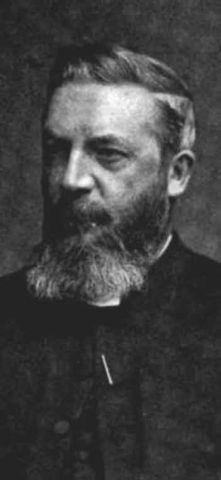 Samuel J. Stone (1839-1900) was an Anglican clergyman and poet whose claim to fame is that he wrote the hymn, The Church’s One Foundation. But that’s just the hit single off a great album. That hymn is from an interesting collection that Stone wrote in 1866 entitled Lyra Fidelium: Twelve Hymns on the Twelve Articles of the Apostles Creed. It’s available online here.
Samuel J. Stone (1839-1900) was an Anglican clergyman and poet whose claim to fame is that he wrote the hymn, The Church’s One Foundation. But that’s just the hit single off a great album. That hymn is from an interesting collection that Stone wrote in 1866 entitled Lyra Fidelium: Twelve Hymns on the Twelve Articles of the Apostles Creed. It’s available online here.
According to Kenneth Osbeck, it was a controversy over liberal theology that provoked Stone to put a complete statement of Christian doctrine into hymn form. But Stone doesn’t mention that in his preface, where he simply offers these 12 hymns as a way of increasing the theological understanding of people “among the poor especially” who are in the habit of saying the creed during prayer time, but with little insight into its meaning. There are plenty of theological commentaries on the creed, he says, but you can’t really pray them. Putting them into poetic form would be “effectual in securing an abiding place in the general mind, and also in exercising an influence upon heart and life.”
1. I believe in God the Father, Almighty, Maker of heaven and earth: None Else But Thee
2. And in Jesus Christ, his only begotten Son, our Lord: God the Father’s Only Son
3. Who was conceived by the Holy Ghost, born of the Virgin Mary: The Son Forsook the Father’s Home
4. Suffered under Pontius Pilate; was crucified, dead and buried: My Saviour, I Behold Thy Life
5. He descended into hell: The third day he rose again from the dead: All The Sacrifice Is Ended
6. He ascended into heaven,and sits at the right hand of God the Father Almighty: On Olivet a Little Band
7.From thence he shall come to judge the quick and the dead: Mistful Are Our Waiting Eyes
8. I believe in the Holy Ghost: God the Spirit We Adore Thee
9. I believe in the holy catholic church: the communion of saints: The Church’s One Foundation
10. The forgiveness of sins: Weary of Earth and Laden With My Sins
11. The resurrection of the body: Winter in His Heart of Gloom
12. And the life everlasting. The World is Sad With Hopes that Die
Amen.
Stone wrote many other hymns and poems, ranging all over Christian doctrine and experience. He was as good at giving voice to the grand, objective truths of Christianity as he was at scripting the heart’s subjective response to the living God. His hymn on the Macedonian call to world evangelism reveals how much he must have mused on this passage of scripture (Acts 16:9) in light of world missions:
Through midnight gloom from Macedon
The cry of myriads as of one,
The voiceful silence of despair,
Is eloquent in awful prayer,
The soul’s exceeding bitter cry,
“Come o’er and help us, or we die.”How mournfully it echoes on!
For half the earth is Macedon;
And even the charged subject of Jewish evangelism could be rendered poetical by Stone, as in the hymn Unchanging God, written for the East London Mission to the Jews:
Bring Thy belovèd back, Thine Israel,
Thine own elect who from Thy favor fell,
But not from Thine election! O forgive,
Speak but the word, and lo! the dead shall live.Father of mercies! these the long astray,
These in soul blindness now the far away,
These are not aliens, but Thy sons of yore,
Oh, by Thy Fatherhood, restore, restore!Breathe upon Thy Church, that it may greet the day;
Stir up her will to toil, and teach, and pray,
Till Zionward again salvation come,
And all her outcast children are at home.
Stone wrote many other hymns and poems, some justly forgotten (like the ill-conceived Soliloquy of the Rationalistic Chicken), but some worth a look (the English versification of some Latin poems by Thomas a Kempis)
But most of all, when you want to heave your heart into what you believe, try singing the creed with Stone.